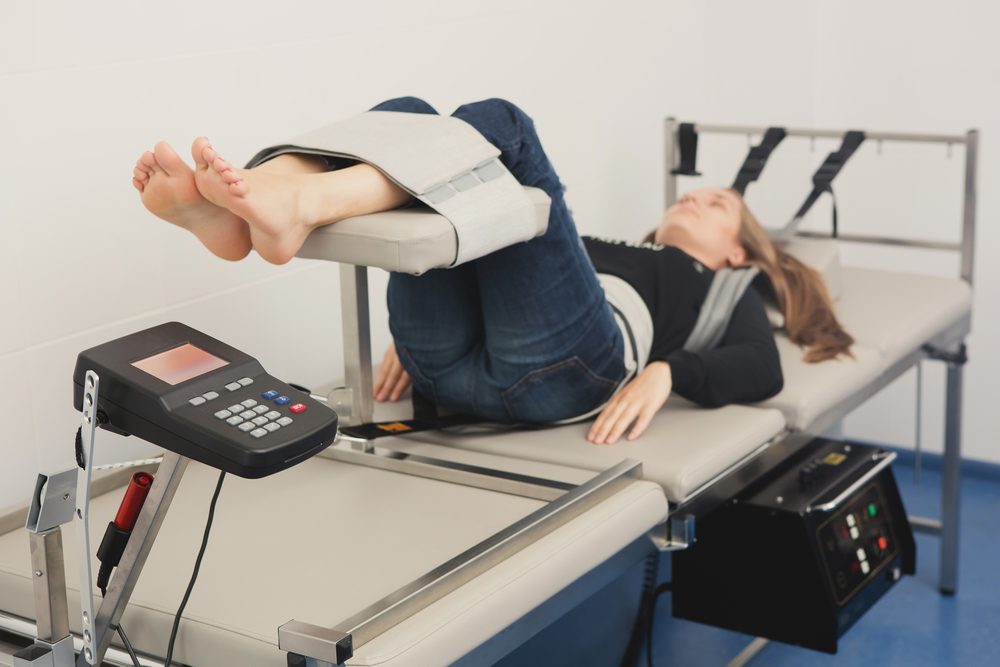
Hyperthyroidism and hypothyroidism are types of thyroid disease and occurs when the thyroid is either overactive and producing far too many hormones (hyperthyroidism) or not active enough and not producing enough hormone (hypothyroidism). Thyroid problems can develop at any point during your lifetime, but they most commonly diagnosed in people who are in their middle-aged years.
There are a number of different factors that can contribute to the development of thyroid issues. These include:
Genetics
If you have a blood relative with thyroid issues, you are more likely to be affected.
Gender
Generally, thyroid problems are more common in women than men.
Stress
Persistently high stress levels have been shown to trigger the symptoms of thyroid diseases.
Pregnancy
Pregnancy often affects the thyroid, and some women go on to develop hyperthyroidism during or after their pregnancy.
What Is Non-Surgical Spinal Decompression?
As its name suggests, non-surgical spinal decompression treatment refers to the use of a non-invasive traction technique to stretch the spine and create negative pressure. The purpose of this is to relieve the pressure on the spine that is causing issues such as disc herniation and subluxations. However, many people are surprised to learn that this technique can also be used to address some thyroid issues.
The Role of The Spine In Thyroid Health
The thyroid is a small, butterfly-shaped gland found at the front of the neck, under your voice box. The purpose of the thyroid is to regulate your metabolism – which is the process responsible for breaking down food and converting it into energy. The faster your metabolism is, the more quickly it breaks down food for energy. They thyroid also creates hormones, and these do many other things, such as control how fast your heart is beating, your breathing, your body temperature and how easily you gain or lose weight.
It may seem as though the spine and thyroid have little in common, but this isn’t the case. Swelling and inflammation of the area around the thyroid gland can easily impact on the vertebrae in the cervical spine, putting them under pressure that causes them to slip out of place. This is known as a subluxation, or spinal misalignment, and can cause pain, mobility problems and other issues.
Long term thyroid imbalances have also been shown to cause damage to your peripheral nerves, which are the nerves responsible for carrying information from your brain and spinal cord to the rest of your body. This is known as peripheral neuropathy and causes painful and debilitating symptoms such as pain, numbness and tingling, as well as muscle weakness and loss of muscle control.
How Can Non-Surgical Spinal Decompression Help?
Non-surgical spinal decompression has been shown to help with a variety of spinal issues, including symptoms that may have been caused by thyroid problems. These include:
Arm Pain
This is pain that travels from your cervical spine, through your shoulders and down into your arms and hands. By reducing pressure on the cervical spine through decompression, it will also reduce pressure on any nerves that have become pinched and are causing the pain, weakness and other symptoms you may be experiencing.
Subluxations
If you have a subluxation as a result of issues with your thyroid, decompression can reduce pressure and enable your chiropractor to manipulate your spine so that the vertebrae are in alignment once more. Regular chiropractic treatment will help ensure that your spine remains in the optimal position at all times.
To learn more about using spinal decompression to address thyroid issues, call Elevate Life Health Center in Kansas City, Missouri at 816-339-5900.









